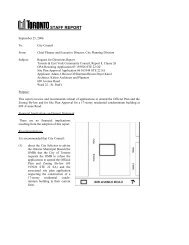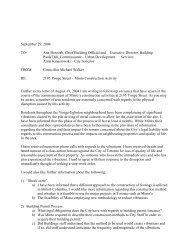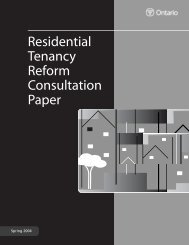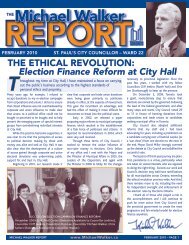Residential Tenancies Act: Briefing Book - Michael Walker
Residential Tenancies Act: Briefing Book - Michael Walker
Residential Tenancies Act: Briefing Book - Michael Walker
Create successful ePaper yourself
Turn your PDF publications into a flip-book with our unique Google optimized e-Paper software.
<strong>Residential</strong> <strong>Tenancies</strong> <strong>Act</strong>, 2007<br />
B R I E F I N G B O O K<br />
Frequently Asked Questions<br />
� The Federation of Metro Tenants’ Association (FMTA) will be offering<br />
education workshops to tenant groups about tenant rights and obligations<br />
under the RTA throughout 2007. For more information, please contact the<br />
FMTA Outreach Coordinator at 416-413-9442.<br />
� The FMTA runs a Tenant Hotline with trained staff who can explain<br />
tenants’ rights and obligations, while providing advice on matters ranging<br />
from rent increases to maintenance to eviction. Counselling Services are<br />
available in 150 languages through the AT&T telephone interpreting<br />
service. The Tenant Hotline can be reached at 416-921-9494.<br />
� The FMTA produces the “Guide to Tenants’ Rights” booklet available at<br />
www.torontotenants.org/guide.htm. The booklet is currently available in<br />
English but plans are underway to translate it into 12 different languages.<br />
The FMTA also updates the Tenant Survival Manual regularly. The 2007<br />
Manual is being updated to reflect the changes in the RTA and will be<br />
available later this year.<br />
Landlords can contact the Landlord and Tenant Board at 416-645-8080 or visit<br />
the Board’s website at www.ltb.gov.on.ca, or the Landlord’s Self-Help Centre<br />
website at www.landlordselfhelp.com.<br />
FOR TENANTS:<br />
Q: I am about to move to a new rental apartment. Do I need to sign a lease? If<br />
yes, what should I expect to have included?<br />
A: The RTA does not require all landlords and tenants to have a written tenancy<br />
agreement or lease. A tenancy agreement can be oral or written. However, it is<br />
generally better to have it in writing because if there is a dispute later, a written<br />
record of the agreement may help to settle the dispute.<br />
A written lease agreement must set out the legal name and address of the landlord<br />
so that you know where to send any notices or documents that are required under<br />
the <strong>Act</strong>.<br />
It may also contain information about:<br />
� the date you will move into the rental unit;<br />
� the rent amount;<br />
� the date rent is to be paid;<br />
5






